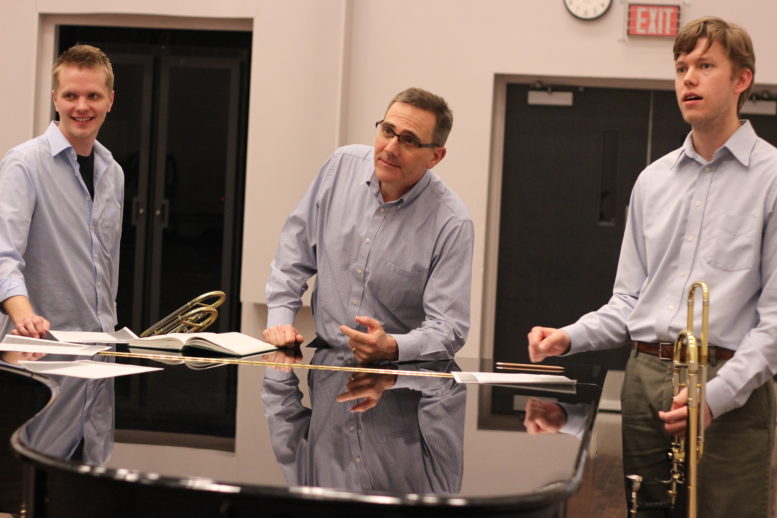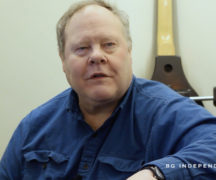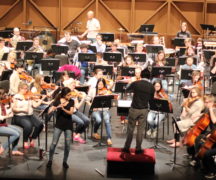By DAVID DUPONT
BG Independent News
William Mathis takes charge as dean of the College of Musical Arts at a crucial time for arts education.
Focusing on the traditional paths of performance and music education will not be enough for higher education music programs.
“It’s a different arts and musical landscape then when I was coming up,” said Mathis, 56. While making sure students continue to achieve “technical and musical mastery,” the college needs to broaden its offerings.
“We talk a lot about musical entrepreneurship, and I’ve been thinking about citizenship in the arts, arts advocacy and the connection to communities, and how the arts can impact the life of society in our local community,” he said. “The skills that requires are not part of a traditional music curriculum. How can we give that to them? I’ve been thinking about this a lot this year.”
Music programs, and arts programs in general, need to prepare their student for a new entrepreneurial environment. “Twenty years from now the schools of music adapting to this will be around,” Mathis said. The fate of those sticking to the more traditional approach is less certain.
Mathis wants BGSU to in the forefront of those that survive.
Mathis stepped into the role of interim dean last July after Jeff Showell announced his retirement. After a national search, he was named dean in February.
Mathis said he felt his administrative background made him a prime internal candidate for the permanent position. He’s served as chair of the Department of Performance Studies and as the college’s graduate coordinator.
“I have a disposition that lends itself to this kind of work,” he said. “If I may, the kind of balancing, the level of ambiguity that kind of exists all the time… doesn’t scare me.”
The key is “to be able to navigate through this with some kind of strategic vision and action because there’s so many external forces we don’t have control over. …. I have a higher tolerance for that where others may get frustrated. …It’s not work for everyone.”
Mathis’ predilection for the administrative side may stem to his upbringing. Raised in Wichita, Kansas, his father was a band director who worked his way up to become associate dean of the College of Fine Arts at Wichita State.
Mathis studied both trombone and piano. His piano teacher from eighth through 11th grade was Marilyn Shrude, who became his colleague when he moved from University of Louisiana to become professor of trombone at BGSU in 2000.
Though his administrative duties mean being a trombonist is no longer a part of his duties, Mathis said he is committed to remaining active as a musician. During Jazz Week in late March, he locked horns with visiting trombonist Alan Ferber for a boisterous rendition of the jazz classic “Blue Monk.” And he coached the student trombone quartet that played at the recent community interfaith breakfast.
Visiting artist Doug Yeo, retired Boston Symphony bass trombonist and master of the musical serpent, delayed an interview so he could listen in as Mathis had the four trombonists singing the hymn they would play.
That’s a lost art, Yeo said.
That’s not to say Mathis is locked in the past.
For example, he said, he’d like to move the Combustible Ensemble, a group directed by pianist Thomas Rosencrantz, more to the forefront. The group explores contemporary music with an emphasis on improvisation.
Mathis considers the contemporary vocal ensemble Quince, which got its start in the halls of the CMA, as a poster group for the college.
Quince, a quartet that includes three vocalists from BGSU, has secured itself a prominent place on contemporary music scene. That requires skills beyond the traditional curriculum.
Still Mathis wonders: “If we offer a class of small business entrepreneurship is it appreciated or is that something we have to learn the job?”
Kayleigh Butcher, of Quince, said in an interview before the group’s performance at BGSU earlier this year, that she would have liked to have had some business training while at BGSU. Quince, as is the case with most new music groups, is self-run.
The college still has the task of recruiting the best musicians with “the appropriate array of instrumentation.” BGSU’s reputation is such that it competes with the University of Michigan and Ohio State for top talent. That means having the scholarship support to entice musicians here.
Provost Rodney Rogers has given Mathis another charge. In the letter announcing his appointment, Rogers wrote: “In addition to serving as dean, Dr. Mathis will be responsible for leading the broader interdisciplinary arts strategy for BGSU.”
That means working closely with Dean Ray Craig of the College of Arts and Sciences, the home of the School of Art, the Creative Writing Program, and the Department of Theatre and Film. The dance program resides in the School of Human Movement, Sport, and Leisure Studies in the College of Education and Human Development.
“We have a clear, three-prong goal,” Mathis said.
Those guideposts are:
- To enhance and create a culture of the arts on campus.
- To reach out build an audience in the greater community for the arts at BGSU.
- To increase collaboration among all the arts.
The mission is to make “the arts an impactful presence for our students” and to share those activities with the community.
Mathis understands that making such changes takes time. “The kind of things you want to put in place don’t move at record speed in higher education. It’s like steering a large ship.”
He sees being dean as the job that will lead into retirement.
In his time here, he said, he has developed “a devotion and love for BGSU and the College of Musical Arts. Speaking for himself and his family, he said: “We’re invested here.”





